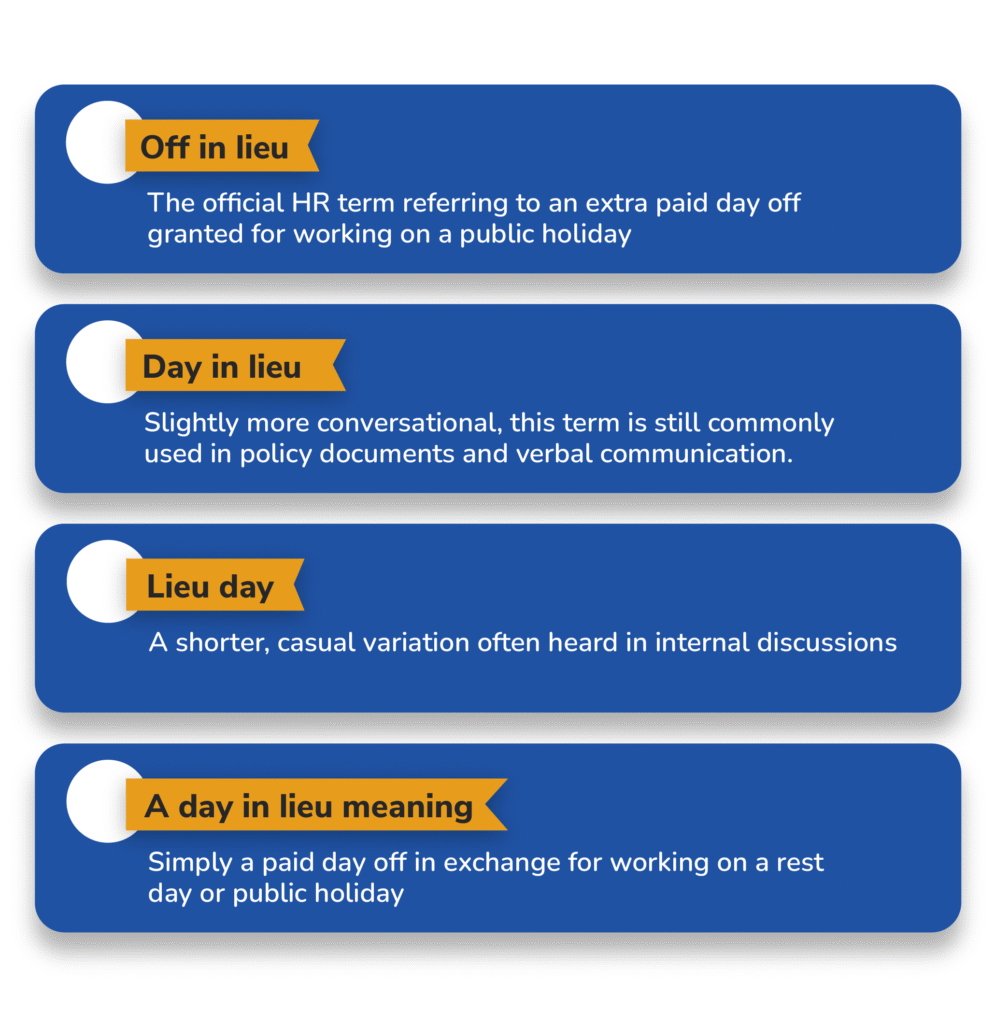Introduction: Getting to Grips with “Off In Lieu” in Today’s Workplaces
In the changing job world of today, flexibility and fairness shape good HR work. One rule that backs up both is “off in lieu” — a term people often use but don’t always grasp .
If you work in HR and write company rules, or if you’re an employee who plans your own schedule, you need to know how off in lieu works to follow the rules and keep the workplace running smoothly
This is true in Singapore where the MOM’s Employment Act has rules about public holidays, rest days, and overtime. Managing off in lieu properly can boost work efficiency and keep employees happy.
“Off in lieu” means giving workers a day off instead of extra money when they work on a public holiday or rest day.
What Does “Off In Lieu” Mean?
Simple Definition
Off in lieu (also known as “time off in lieu” or “day in lieu”) means a substitute rest day given to workers who do their job on a planned rest day or public holiday.
Rather than getting extra pay, workers can have another day off — with full wages — at a future date.
Example: If you work on National Day, your boss might give you another day off later that month. That substitute day is your off in lieu.
Why Companies Have Off In Lieu
For HR off in lieu strikes a good balance between costs, following rules, and keeping workers happy.
Main Reasons:
- Money-Saving: Cuts down on payroll costs by swapping paid overtime for days off.
- Worker Health: Gives time to recharge after putting in extra work.
- Following Rules: Helps bosses meet MOM’s rules for staff working on public holidays or rest days.
Everyone wins — workers feel appreciated, and bosses stay within the law while keeping costs in check.
Other Names for “Off In Lieu”
Different workplaces call it different things, but they all mean the same: ay encounter various terms that seem confusing. Let’s clarify some common phrases:

People use “off in lieu” and “time off in lieu” to mean the same thing — paid rest for work done outside normal hours.
When Do Employees Get Off In Lieu?
1. Work on Public Holidays
The Employment Act in Singapore says that when non-managers work on public holidays, their bosses must:
- Pay them an extra day’s wages, or
- Give them a day off (off in lieu).
Example: If you work on Deepavali, your boss can pay you for an extra day or let you take a different day off.
2. Extra Hours or One-Off Tasks
Many businesses do more than what MOM says is needed. Workers putting in time on pressing tasks special occasions, or outside regular hours might get time off instead – even when the law doesn’t say they have to.
This often happens in fields where work comes in shifts or at new companies just starting out.
3. Differences in Company Rules
What you’re entitled to often changes from one workplace to another.
- Some places give time off for working weekends or big events.
- Others do it for public holidays.
It’s best to look at your work agreement or ask the people in charge of hiring for details.
Ways HR Can Handle Time Off Instead Well
1. Set Up Clear Guidelines
HR teams should write down rules that explain:
- Who’s eligible for time off in lieu
- When it’s applicable (e.g., holidays, weekends, after-hours)
- How to request and get the green light
These guidelines should match MOM rules and be given to all staff to avoid any mix-ups.
2. Keep Tabs on Leave Digitally
Paper-based tracking causes mistakes and disagreements. A digital Leave Management System makes sure:
- Leave requests and approvals happen
- Balances stay up-to-date and correct
- Both HR and employees can see what’s going on
Info-Tech’s Leave Management Software has these features, getting rid of paperwork and misunderstandings.
3. Follow MOM Rules
Singapore’s Ministry of Manpower (MOM) expects employers to keep precise records of leave and compensatory days off. Digital tracking makes this easier and ensures your organization stays ready for audits.
Reasons to Choose Info-Tech’s HRMS to Manage Off In Lieu
Small and medium-sized enterprises or expanding teams often find it boring and mistake-prone to handle off in lieu by hand. Info-Tech’s HRMS Software & Leave Management Software makes the whole process smoother.
Info-Tech Allows You To:
- Send leave requests online and include supporting documents.
- Link approvals with shift planning and payroll without extra steps.
- Use ready-made MOM-compliant templates you can adjust.
- Create reports for audits and compliance checks in no time.
By automating these processes, HR teams become more productive while building trust and openness across departments.
Info-Tech’s HRMS has an automated system to track off in lieu ensuring MOM compliance and clear leave management.
Conclusion:
Grasping off in lieu goes beyond HR talk — it shows how companies value hard work and treat people. When done right, it gives credit to employees who put in extra effort while keeping companies in line with rules.
With Info-Tech’s Leave Management Software, HR teams can use tech to track leave, follow MOM guidelines, and build a workplace where people get both rest and recognition.
Give Your HR Team More Power & Look After Your Employees’ Well-being — Request A Demo Now.
Frequently Asked Questions:
What’s the meaning of “off in lieu” in Singapore?
It refers to a paid day off that companies give to workers who work on a public holiday or rest day instead of paying them extra.
Who can get off in lieu?
Workers covered by Singapore’s Employment Act who work on a scheduled public holiday or rest day have a right to it.
Do companies have to give off in lieu?
Yes, for workers who work on public holidays — bosses must either pay an extra day’s wage or give a different day off.
Can companies offer off in lieu for overtime work?
Yes many companies give time off instead of pay for extra hours worked even when the law doesn’t make them do it.
How can HR manage off in lieu?
By using Info-Tech’s Leave Management Software, which makes it easier to track, approve, and follow MOM rules.

